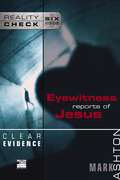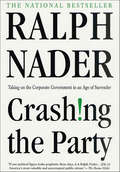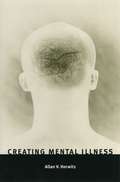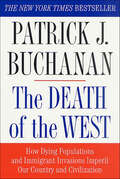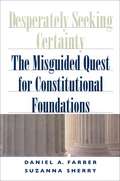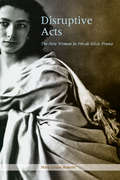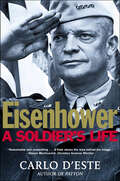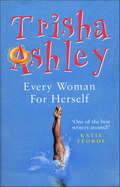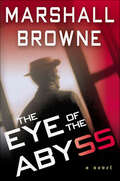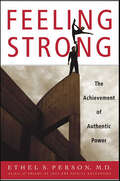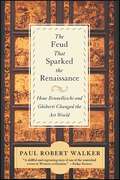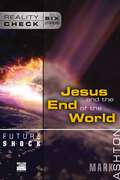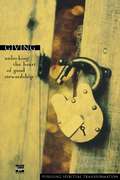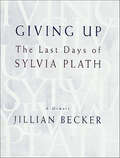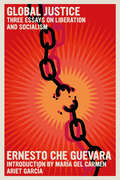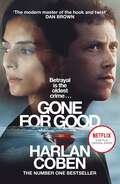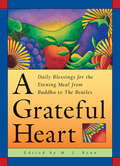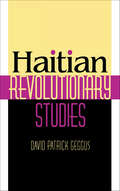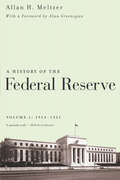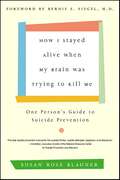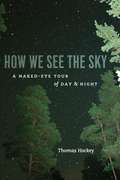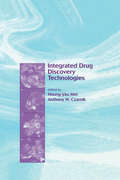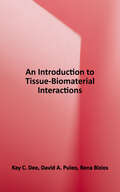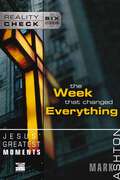- Table View
- List View
Clear Evidence: Eyewitness Reports of Jesus (Reality Check)
by Mark AshtonThe Reality Check series makes just one assumption: that you’re serious enough about your spiritual journey to investigate Christianity with an open mind. This isn’t about joining anyone’s religious club—it’s about being real with yourself and with the others in your group. Since no one has all the answers, there’s plenty of room for discussion. After all, if there is any truth to the Bible’s stories about Jesus, then one thing he’d welcome are questions and opinions that come from honest, earnest hearts.Miracles? Rising from the dead? God Incarnate? Some people say such claims about Jesus are myths and lies. Yet through the years countless others, beginning with Jesus’ closest friends, have staked their lives on the accuracy of those claims. Fortunately, faith is not a leap in the dark. In Clear Evidence, you’ll weigh the arguments for and against the Jesus of the Bible. How convincing is the case for either side? The verdict is yours.Clear Evidence includes these sessions: Credible Sources A Brush with Greatness Reason, Faith, and . . . Miracles? The Finish Line Final Proof Skeptics TurnFor the Group LeaderReality Check is for spiritual seekers of every persuasion. Uncompromisingly Christian in its perspective, it steers wide of pat answers and aims at honesty. This innovative and thought-provoking series will challenge you and those in your group to connect heart to heart as together you explore the interface between Jesus, the Bible, and the realities of this world in which we live.
Crashing the Party: Taking on the Corporate Government in an Age of Surrender
by Ralph NaderRalph Nader is one of America's most passionate and effective social critics. He has been called a muckraker, a consumer crusader, and America's public defender. The cars we drive, the food we eat, the water we drink-their safety has been enhanced largely due to Ralph Nader. His inspiration and example have rallied consumer advocates, citizen activists, public interest lawyers, and government officials into action, and in the 2000 election, nearly three million people voted for him.An inspiring and defiant memoir, Crashing the Party takes us inside Nader's campaign and explains what it took to fight the two-party juggernaut; why Bush and Gore were really afraid to let him in on their debates; why progressive Democrats have been left behind and ignored by their party; how Democrat and Republican interests have been lost to corporate bankrolling; and what needs to happen in the future for people to take back their political system.
Creating Mental Illness
by Allan V. HorwitzIn this surprising book, Allan V. Horwitz argues that our current conceptions of mental illness as a disease fit only a small number of serious psychological conditions and that most conditions currently regarded as mental illness are cultural constructions, normal reactions to stressful social circumstances, or simply forms of deviant behavior. "Thought-provoking and important. . .Drawing on and consolidating the ideas of a range of authors, Horwitz challenges the existing use of the term mental illness and the psychiatric ideas and practices on which this usage is based. . . . Horwitz enters this controversial territory with confidence, conviction, and clarity."—Joan Busfield, American Journal of Sociology "Horwitz properly identifies the financial incentives that urge therapists and drug companies to proliferate psychiatric diagnostic categories. He correctly identifies the stranglehold that psychiatric diagnosis has on research funding in mental health. Above all, he provides a sorely needed counterpoint to the most strident advocates of disease-model psychiatry."—Mark Sullivan, Journal of the American Medical Association "Horwitz makes at least two major contributions to our understanding of mental disorders. First, he eloquently draws on evidence from the biological and social sciences to create a balanced, integrative approach to the study of mental disorders. Second, in accomplishing the first contribution, he provides a fascinating history of the study and treatment of mental disorders. . . from early asylum work to the rise of modern biological psychiatry."—Debra Umberson, Quarterly Review of Biology
The Death of the West: How Dying Populations and Immigrant Invasions Imperil Our Country and Civilization
by Patrick J. BuchananThe national bestseller that shocked the nation--The Death of the West is an unflinching look at the increasing decline in Western culture and power.The West is dying. Collapsing birth rates in Europe and the U. S., coupled with population explosions in Africa, Asia and Latin America are set to cause cataclysmic shifts in world power, as unchecked immigration swamps and polarizes every Western society and nation.The Death of the West details how a civilization, culture, and moral order are passing away and foresees a new world order that has terrifying implications for our freedom, our faith, and the preeminence of American democracy. The Death of the West is a timely, provocative study that asks the question that quietly troubles millions: Is the America we grew up in gone forever?
Desperately Seeking Certainty: The Misguided Quest for Constitutional Foundations
by Daniel A. Farber Suzanna SherryIrreverent, provocative, and engaging, Desperately Seeking Certainty attacks the current legal vogue for grand unified theories of constitutional interpretation. On both the Right and the Left, prominent legal scholars are attempting to build all of constitutional law from a single foundational idea. Dan Farber and Suzanna Sherry find that in the end no single, all-encompassing theory can successfully guide judges or provide definitive or even sensible answers to every constitutional question. Their book brilliantly reveals how problematic foundationalism is and shows how the pragmatic, multifaceted common law methods already used by the Court provide a far better means of reaching sound decisions and controlling judicial discretion than do any of the grand theories.
Disruptive Acts: The New Woman in Fin-de-Siècle France
by Mary Louise RobertsIn fin-de-siècle France, politics were in an uproar, and gender roles blurred as never before. Into this maelstrom stepped the "new women," a group of primarily urban, middle-class French women who became the objects of intense public scrutiny. Some remained single, some entered nontraditional marriages, and some took up the professions of medicine and law, journalism and teaching. All of them challenged traditional notions of womanhood by living unconventional lives and doing supposedly "masculine" work outside the home. Mary Louise Roberts examines a constellation of famous new women active in journalism and the theater, including Marguerite Durand, founder of the women's newspaper La Fronde; the journalists Séverine and Gyp; and the actress Sarah Bernhardt. Roberts demonstrates how the tolerance for playacting in both these arenas allowed new women to stage acts that profoundly disrupted accepted gender roles. The existence of La Fronde itself was such an act, because it demonstrated that women could write just as well about the same subjects as men—even about the volatile Dreyfus Affair. When female reporters for La Fronde put on disguises to get a scoop or wrote under a pseudonym, and when actresses played men on stage, they demonstrated that gender identities were not fixed or natural, but inherently unstable. Thanks to the adventures of new women like these, conventional domestic femininity was exposed as a choice, not a destiny. Lively, sophisticated, and persuasive, Disruptive Acts will be a major work not just for historians, but also for scholars of cultural studies, gender studies, and the theater.
Eisenhower: A Soldier's Life
by Carlo D'Este"An excellent book . . . D'Este's masterly account comes into its own." —The Washington Post Book WorldBorn into hardscrabble poverty in rural Kansas, the son of stern pacifists, Dwight David Eisenhower graduated from high school more likely to teach history than to make it. Casting new light on this profound evolution, Eisenhower chronicles the unlikely, dramatic rise of the supreme Allied commander.With full access to private papers and letters, Carlo D'Este has exposed for the first time the untold myths that have surrounded Eisenhower and his family for over fifty years, and identified the complex and contradictory character behind Ike's famous grin and air of calm self-assurance.Unlike other biographies of the general, Eisenhower captures the true Ike, from his youth to the pinnacle of his career and afterward.
Every Woman for Herself: A Novel
by Trisha AshleyCharlotte—Charlie—Rhymer's husband wants a divorce. Charlie isn't sure what she wants, but after the incident with the frying pan, even she has to concede that their differences may be irreconcilable after all. Returning home to her native Yorkshire and the bosom of her family seemed like a good idea at the time. Even if Charlie's father has never quite forgiven Charlie or her siblings (Anne, Emily and Branwell) for failing to live up to their more literary (as in Bronte) namesakes.Upvale Parsonage, the family home to which Charlie has retreated, is presided over by her sister Em. Em's hobbies are composing inspirational verses, dabbling in the Ancient Black Arts, and fighting off the incursions of Father's latest mistress. When the current mistress actually moves in, family loyalties are sorely tried. Still, Charlie is determined to bounce back from disaster and strike a blow for deserted older wives everywhere. But when she meets brooding actor Mace North, she realizes that when it comes to dating for the over-forty crowd, female solidarity be damned—it's every woman for herself!Sure to delight both Bronte fans and readers who like a good laugh with their romance, Trisha Ashley's first book to be published in the United States is a welcome treat.
The Eye of the Abyss: A Novel
by Marshall BrowneIt is Germany, 1938, and Franz Schmidt is the chief auditor in a commercial bank in a provincial city. But as Schmidt will soon learn, the bank's prestigious new client, the Nazi party, is at once its least desirable. Schmidt will oversee their account, and soon, he is embroiled in the duplicity, violence and horror that is Nazi Germany. Schmidt can't help but be involved, and the first victim of the harsh realities of the Germans' politics is a Jewish secretary whom Franz tries to help, much to his wife's distress. As Schmidt finds himself caught up in dangerous political machinations, he also finds himself, as the result of an act of compassion, under deadly suspicion. The Schmidts struggle to protect their marriage and their family without compromising their sense of decency, but eventually, Franz's world explodes. As events spin out of control, Franz must act, and he seeks revenge on those responsible by attempting a massive fraud on the Party itself. In Eye of the Abyss, Marshall Browne crafts an intelligent historical thriller reminiscent of Philip Kerr, Christopher Reich and Alan Furst with a riveting pace and spellbinding plot all his own.
Feeling Strong: How Power Issues Affect Our Ability to Direct Our Own Lives
by Ethel S. PersonIn Feeling Strong, noted psychoanalyst Ethel S. Person redefines the notion of power. Power is often narrowly understood as the force exerted by the politicians and business leaders who seem to be in charge and by the rich and famous who monopolize our headlines. The whiff of evil we often catch when the subject of power is in the air comes from this one conception of power-- the drive for dominance over other people, or, in its most extreme form, an overriding and often ruthless lust for total command. But this is far too limited a definition of power.Pointing to a more fulfilling sense of self-empowerment than is being touted in pop-psychology manuals of our time, Feeling Strong shows us that power is really our ability to produce an effect, to make something we want to happen actually take place. Power is a desire and a drive, and it central in our lives, dictating much of our behavior and consuming much of our interior lives.We all have a need to possess power, use it, understand it and negotiate it. This holds true not just in mediating our sex and love lives, our family lives and friendships, our work relationships but in seeking to realize our dreams, whether in pursuit of our ambitions, expression of our creative impulses, or in our need to identify with something larger than ourselves. These separate kinds of power are best described as interpersonal power and personal power, respectively, and they call on different parts of our psyche. Ideally, we acquire competence in both domains.Drawing from her expertise honed in clinical practice, as well as from examples in literature and true-life vignettes, Person shows how we can achieve authentic power, a fundamental and potentially benevolent part of human nature that allows us to experience ourselves as authentically strong. To find something that matters; to live life at a higher pitch; to feel inner certainty; to find a personality of your own and effectively plot our own life story -- these are the forms of power explored in the book. To achieve and maintain such empowerment always entails struggle and is a life-long journey. Feeling Strong will lead the way.
The Feud That Sparked the Renaissance: How Brunelleschi and Ghiberti Changed the Art World
by Paul Robert WalkerJoining the bestsellers Longitude and Galileo’s Daughter, a lively and intriguing tale of two artists whose competitive spirit brought to life one of the world’s most magnificent structures and ignited the RenaissanceThe dome of the Santa Maria del Fiore, the great cathedral of Florence, is among the most enduring symbols of the Renaissance, an equal to the works of Leonardo and Michelangelo. Its designer was Filippo Brunelleschi, a temperamental architect and inventor who rediscovered the techniques of mathematical perspective. Yet the completion of the dome was not Brunelleschi’s glory alone. He was forced to share the commission with his archrival, the canny and gifted sculptor Lorenzo Ghiberti. In this lush, imaginative history—a fascinating true story of artistic genius and personal triumph—Paul Robert Walker breathes life into these two talented, passionate artists and the competitive drive that united and dived them. As it illuminates fascinating individuals from Donatello and Masaccio to Cosimo de’Medici and Leon Battista Alberti, The Feud That Sparked the Renaissance offers a glorious tour of 15th-century Florence, a bustling city on the verge of greatness in a time of flourishing creativity, rivalry, and genius.
Future Shock: Jesus and the End of the World (Reality Check)
by Mark AshtonThe Reality Check series makes just one assumption: that you’re serious enough about your spiritual journey to investigate Christianity with an open mind. This isn’t about joining anyone’s religious club—it’s about being real with yourself and with the others in your group. Since no one has all the answers, there’s plenty of room for discussion. After all, if there is any truth to the Bible’s stories about Jesus, then one thing he’d welcome are questions and opinions that come from honest, earnest hearts.What do you think the future holds? Right now it looks pretty scary. And Bible prophecy hardly brightens the picture—not with its mind-boggling images of singing saints, ten-horned monsters, mystical numbers, and a lake of fire. What does it all mean? Fortunately, it does mean something. A great deal. And while the Bible paints a grim future for a world bent on worshiping its own ways, it offers great hope for those whose hearts are set on God. Future Shock includes these sessions: Will Jesus Return This Year? · The Scroll Opener · After the Gavel Falls . . . · Ultimate Evil: The Antichrist, the Beast, and 666 · Happily Ever After? · Flight TrainingFor the Group LeaderReality Check is for spiritual seekers of every persuasion. Uncompromisingly Christian in its perspective, it steers wide of pat answers and aims at honesty. This innovative and thought-provoking series will challenge you and those in your group to connect heart to heart as together you explore the interface between Jesus, the Bible, and the realities of this world in which we live.
Giving: Unlocking the Heart of Good Stewardship (Pursuing Spiritual Transformation)
by John Ortberg Laurie Pederson Judson PolingJesus said more about money than just about any other topic. Clearly, it is an important issue--and a touchy one! Deep down, we know it is not a matter of what we earn but how we manage what we earn that shows our ultimate priorities.Giving demonstrates how good stewardship is more than a responsibility—it’s an adventure. As you study the connection between your wallet and your heart, you’ll learn how money management is a powerful tool for shaping your character. You’ll discover how giving is as much a part of spiritual growth as prayer and Bible study. And you’ll learn about the rewards of cultivating wise financial habits and a generous heart. Above all, you’ll find out how a lifestyle of giving reflects the heart of God, who freely gives his best to you.Leader’s guide included!Giving group sessions are:Money: Why Is It So Important to God?The Open Hands of GodTithing: A Training Exercise for the HeartBehind the Scenes of DebtWhat Is a Biblical Lifestyle?Cultivating a Heart of CompassionThe Chance of a Lifetime
Giving Up: The Last Days of Sylvia Plath
by Jillian BeckerGiving Up is Jillian Becker's intimate account of her brief but extraordinary time with Sylvia Plath during the winter of 1963, the last months of the poet's life. Abandoned by Ted Hughes, Sylvia found companionship and care in the home of Becker and her husband, who helped care for the estranged couple's two small children while Sylvia tried to rest. In clear-eyed recollections unclouded by the intervening decades, Becker describes the events of Sylvia's final days and suicide: her physical and emotional state, her grief over Hughes's infidelity, her mysterious meeting with an unknown companion the night before her suicide, and the harsh aftermath of her funeral. Alongside this tragic conclusion is a beautifully rendered portrait of a friendship between two very different women.
Global Justice: Three Essays on Liberation and Socialism (The Che Guevara Library)
by Ernesto Che GuevaraThree speeches on corporate globalism and imperialism by one of the most widely known guerilla fighters, political theorists, and organizers, Che Guevara.In this collection of three speeches, Ernesto Che Guevara offers a revolutionary view of a world in which human solidarity and understanding replace imperialist aggression and exploitation. First, in a sharp speech given in Algeria on February 24, 1965 at the Afro-Asia Economic Seminar, Che speaks about the nature of capitalism and the revolutionary struggle that would open the way for a new, socialist society. Guevara's 1965 essay, "Socialism and Man in Cuba," is a milestone in twentieth-century emancipatory social thought. Finally, &“Message to the Tricontinental&” is one of Che&’s more well-known works, which outlines the tactics and strategies that should be followed in revolutionary struggle. This collection of writings merges Che's philosophy, politics, and economics in his all encompassing, coherent revolutionary vision. His ideas and his struggle strike a chord in the current search for global justice.
Gone for Good: Now a major Netflix series
by Harlan CobenNOW A NETFLIX ORIGINAL SERIES! The bestselling author and creator of the hit Netflix drama Fool Me Once takes readers into the heart of a family in this twisty page-turner that proves the darkest secrets are often closest to home.As a boy, Will Klein had a hero: his older brother, Ken. Then, on a warm summer night a young woman-a girl Will had once loved-was found brutally murdered in her family's basement. The prime suspect: Ken Klein. With the evidence against him overwhelming, Ken simply vanished. And when his shattered family never heard from Ken again, they were sure he was gone for good. Now eleven years have passed. Will has found proof that Ken is alive. And this is just the first in a series of stunning revelations as Will is forced to confront startling truths about his brother-and himself. As a violent mystery unwinds around him, Will knows he must press his search all the way to the end. Because the most powerful surprises are yet to come.
A Grateful Heart: Daily Blessings for the Evening Meals from Buddha to The Beatles (Daily Blessings For The Evening Meal From Buddha To The Beat Ser.)
by M. J. RyanCelebrate the Human Experience by Giving Thanks at Mealtime. Try It!Count your blessings. Today there is a deep hunger for connection with ourselves, with nature, and with the process of birth and death itself says life coach and author M. J. Ryan, creator of the New York Times best-selling Random Acts of Kindness series. What her book, A Grateful Heart, is offering from a wide variety of spiritual disciplines and secular perspectives, is a way of satisfying that hunger by setting aside time before we eat to acknowledge the blessings in our lives. When we give thanks, we take our place in the great wheel of life, recognizing our connection to one another and to all of creation.Choose from 365 blessings and give thanks. A Grateful Heart is a tool to help readers reclaim and enrich the tradition of pausing before the evening meal to give thanks. Drawing from a range of religious and cultural practices, the 365 blessings in this book celebrate friendship, love, peace, reconciliation, the body, nature, joy, and appreciation of the moment. This illustrated feast for the mind includes quotations from Martin Luther King Jr., Thich Nhat Hanh, Gandhi, Rumi, Mother Teresa, Helen Keller, Denise Levertov, the Bible, and the Tao Te Ching.M. J. Ryan wrote A Grateful Heart to encourage families to share the experience of being part of something greater than themselves. With that in mind, the book includes 365 traditional and nontraditional blessings organized into four sections corresponding to the seasons.Experience the blessings in A Grateful Heart in a variety of ways:Just open it and begin reading one-a-day in the order givenUse the index to pick and choose topics of interest that dayOpen at random and read what is offeredIf you have benefited from books such as Earth Prayers, M. J. Ryan’s Attitudes of Gratitude, Don Miguel Ruiz’s Prayers, June Cotner’s Graces, or Marcia M. Kelly’s 100 Graces; you and your family will love M. J. Ryan’s A Grateful Heart.
Haitian Revolutionary Studies (Blacks in the Diaspora)
by David Patrick GeggusThe Haitian Revolution of 1789–1803 transformed the Caribbean's wealthiest colony into the first independent state in Latin America, encompassed the largest slave uprising in the Americas, and inflicted a humiliating defeat on three colonial powers. In Haitian Revolutionary Studies, David Patrick Geggus sheds new light on this tremendous upheaval by marshaling an unprecedented range of evidence drawn from archival research in six countries. Geggus's fine-grained essays explore central issues and little-studied aspects of the conflict, including new historiography and sources, the origins of the black rebellion, and relations between slaves and free people of color. The contributions of vodou and marronage to the slave uprising, Toussaint Louverture and the abolition question, the policies of the major powers toward the revolution, and its interaction with the early French Revolution are also addressed. Questions about ethnicity, identity, and historical knowledge inform this essential study of a complex revolution.
A History of the Federal Reserve: 1913–1951
by Allan H. MeltzerAllan H. Meltzer's monumental history of the Federal Reserve System tells the story of one of America's most influential but least understood public institutions. This first volume covers the period from the Federal Reserve's founding in 1913 through the Treasury-Federal Reserve Accord of 1951, which marked the beginning of a larger and greatly changed institution. To understand why the Federal Reserve acted as it did at key points in its history, Meltzer draws on meeting minutes, correspondence, and other internal documents (many made public only during the 1970s) to trace the reasoning behind its policy decisions. He explains, for instance, why the Federal Reserve remained passive throughout most of the economic decline that led to the Great Depression, and how the Board's actions helped to produce the deep recession of 1937 and 1938. He also highlights the impact on the institution of individuals such as Benjamin Strong, governor of the Federal Reserve Bank of New York in the 1920s, who played a key role in the adoption of a more active monetary policy by the Federal Reserve. Meltzer also examines the influence the Federal Reserve has had on international affairs, from attempts to build a new international financial system in the 1920s to the Bretton Woods Agreement of 1944 that established the International Monetary Fund and the World Bank, and the failure of the London Economic Conference of 1933. Written by one of the world's leading economists, this magisterial biography of the Federal Reserve and the people who helped shape it will interest economists, central bankers, historians, political scientists, policymakers, and anyone seeking a deep understanding of the institution that controls America's purse strings. "It was 'an unprecedented orgy of extravagance, a mania for speculation, overextended business in nearly all lines and in every section of the country.' An Alan Greenspan rumination about the irrational exuberance of the late 1990s? Try the 1920 annual report of the board of governors of the Federal Reserve. . . . To understand why the Fed acted as it did—at these critical moments and many others—would require years of study, poring over letters, the minutes of meetings and internal Fed documents. Such a task would naturally deter most scholars of economic history but not, thank goodness, Allan Meltzer."—Wall Street Journal "A seminal work that anyone interested in the inner workings of the U. S. central bank should read. A work that scholars will mine for years to come."—John M. Berry, Washington Post "An exceptionally clear story about why, as the ideas that actually informed policy evolved, things sometimes went well and sometimes went badly. . . . One can only hope that we do not have to wait too long for the second installment."—David Laidler, Journal of Economic Literature "A thorough narrative history of a high order. Meltzer's analysis is persuasive and acute. His work will stand for a generation as the benchmark history of the world's most powerful economic institution. It is an impressive, even awe-inspiring achievement."—Sir Howard Davies, Times Higher Education Supplement
How I Stayed Alive When My Brain Was Trying to Kill Me: One Person's Guide to Suicide Prevention
by Susan Rose Blauner“Sue Blauner’s you-are-there account . . . offers insight and understanding to anyone who has been touched by suicide.”—Joan Anderson, author of A Year by the SeaAn epidemic of international proportions, suicide has touched the lives of nearly half of all Americans, yet is rarely talked about openly. In this timely and important book, Susan Blauner breaks the silence to offer guidance and hope for those contemplating ending their lives—and for the loved ones who want to help them. A survivor of multiple suicide attempts, Blauner eloquently describes the feelings and fantasies surrounding suicide. In a direct, nonjudgmental, and loving voice, she offers affirmations and suggestions for those experiencing life-ending thoughts, and for their friends and family. Here is an essential resource destined to be the classic guide on the subject.
How We See the Sky: A Naked-Eye Tour of Day & Night
by Thomas HockeyGazing up at the heavens from our backyards or a nearby field, most of us see an undifferentiated mess of stars—if, that is, we can see anything at all through the glow of light pollution. Today’s casual observer knows far less about the sky than did our ancestors, who depended on the sun and the moon to tell them the time and on the stars to guide them through the seas. Nowadays, we don’t need the sky, which is good, because we’ve made it far less accessible, hiding it behind the skyscrapers and the excessive artificial light of our cities. How We See the Sky gives us back our knowledge of the sky, offering a fascinating overview of what can be seen there without the aid of a telescope. Thomas Hockey begins by scanning the horizon, explaining how the visible universe rotates through this horizon as night turns to day and season to season. Subsequent chapters explore the sun’s and moon’s respective motions through the celestial globe, as well as the appearance of solstices, eclipses, and planets, and how these are accounted for in different kinds of calendars. In every chapter, Hockey introduces the common vocabulary of today’s astronomers, uses examples past and present to explain them, and provides conceptual tools to help newcomers understand the topics he discusses. Packed with illustrations and enlivened by historical anecdotes and literary references, How We See the Sky reacquaints us with the wonders to be found in our own backyards.
In the Forest: A Novel
by Edna O'BrienIn the Forest is a newly reissued edition of the terrifying novel from "one of the greatest writers in the English-speaking world" (The New York Times), Edna O'Brien."O'Brien brings together the earthy and delicately poetic: she has the sound of Molly Bloom and the skills of Virginia Woolf." —NewsweekO'Brien takes her reader into the mind of Michen O'Kane, a murder who terrorizes the countryside of western Ireland, and traces his transformation from a neglected child to a twisted killer. In the Forest is based on a true story of local horror, and O'Brien provides fragments of O'Kane's story while leaving her reader to try and make sense of his psyche.
Integrated Drug Discovery Technologies
by Houng-Yau Mei Anthony W. CzarnikIntegrated Drug Discovery Technologies provides a global overview of emerging drug development technologies by presenting and integrating new techniques from the disciplines of chemistry, biology, and computational sciences. It combines integration of contemporary mechanization with strategies in drug delivery. Topics include: target identification and validation, functional genomics, microfabrication techniques, integrated proteomics technologies, high throughput screening, fluorescence correlation spectroscopy methods, and screening lead compounds in the post-genomic era.
An Introduction to Tissue-Biomaterial Interactions
by Rena Bizios David A. Puleo Kay C. DeeThis book acquaints an undergraduate audience with the fundamental biological processes that influence these sophisticated, cutting-edge procedures. Chapters one through three provide more detail about the molecular-level events that happen at the tissue-implant interface, while chapters four through ten explore selected material, biological, and physiological consequences of these events. The importance of the body’s wound-healing response is emphasized throughout. Specific topics covered include: Structure and properties of biomaterials - Proteins - Protein-surface interactions - Blood-biomaterial interactions - Inflammation and infection - The immune system - Biomaterial responses to implantation - Biomaterial surface engineering - Intimal hyperplasia and osseointegration as examples of tissue-biomaterial interactions The text also provides extensive coverage of the three pertinent interfaces between the body and the biomaterial, between the body and the living cells, and between the cells and the biomaterial that are critical in the development of tissue-engineered products that incorporate living cells within a biomaterial matrix. Ideal for a one-semester, biomedical engineering course, An Introduction to Tissue-Biomaterial Interactions provides a solid framework for understanding today’s and tomorrow’s implantable biomedical devices.
Jesus' Greatest Moments: The Week That Changed Everything (Reality Check)
by Mark AshtonThe Reality Check series makes just one assumption: that you’re serious enough about your spiritual journey to investigate Christianity with an open mind. This isn’t about joining anyone’s religious club—it’s about being real with yourself and with the others in your group. Since no one has all the answers, there’s plenty of room for discussion. After all, if there is any truth to the Bible’s stories about Jesus, then one thing he’d welcome are questions and opinions that come from honest, earnest hearts.Never has one week made such a far-reaching difference. It began with the applause of the masses for their controversial hero. It darkened into betrayal, a kangaroo court, and a brutal execution. And it concluded with an event so stunning that it has shaped history ever since: the resurrection of Jesus from the dead. As you relive the dramatic highs and lows of this unparalleled week, you’ll discover why Jesus was far more than a great moral teacher—and why, among all other religious leaders, Jesus stands without equal.Jesus’ Greatest Moments includes these sessions: The Grand Entrance Betrayed by a Friend Framed!? A Dramatic Crisis The Comeback! A Startling ImpactFor the Group LeaderReality Check is for spiritual seekers of every persuasion. Uncompromisingly Christian in its perspective, it steers wide of pat answers and aims at honesty. This innovative and thought-provoking series will challenge you and those in your group to connect heart to heart as together you explore the interface between Jesus, the Bible, and the realities of this world in which we live.
